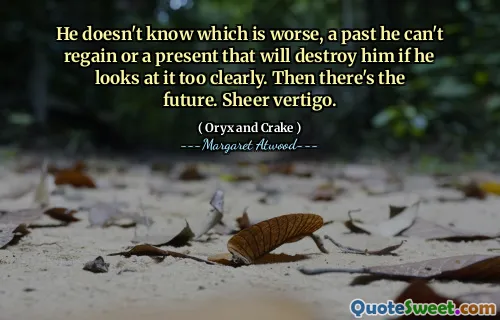Everything in his life was temporary, ungrounded. Language itself had lost its solidity; it had become thin, contingent, slippery, a viscid film on which he was sliding around like an eyeball on a plate. An eyeball that could still see, however. That was the trouble.
In Margaret Atwood's "Oryx and Crake," the protagonist grapples with the fleeting and unstable nature of his life. Everything he experiences feels transient and lacks a solid foundation, leading to a sense of disorientation. Even language, a fundamental means of communication, has taken on an insubstantial quality, making it difficult to find meaning or connection. The imagery of sliding on a slippery surface highlights the fragility of his existence.
Despite this instability, he retains the ability to perceive and understand the world around him, which intensifies his anxiety. Being able to see but feeling unmoored creates a troubling juxtaposition, as he navigates a reality that feels both vivid and illusory. This struggle with the impermanence of life's constructs manifests a deeper existential conflict that resonates throughout the narrative.






